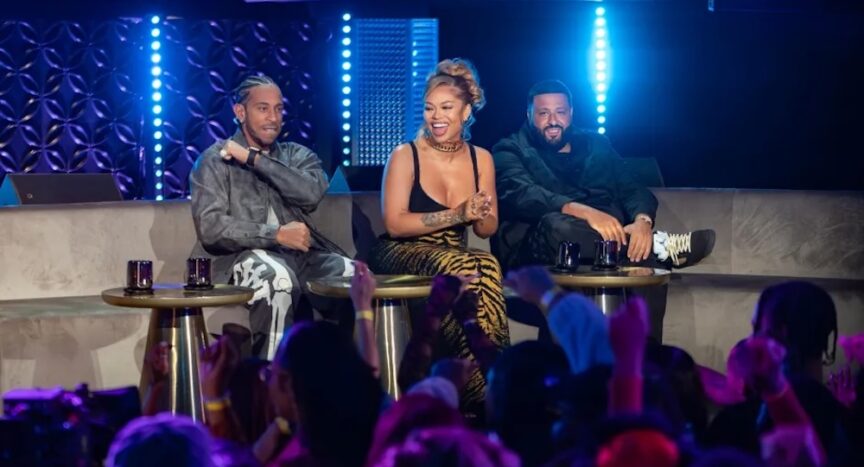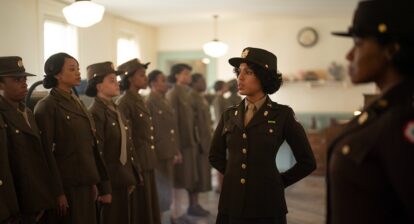Atlanta has been a center of Black life and community since the Reconstruction era. As far as hip-hop is concerned, the ATL has blessed Black folk with enthusiastic cultural memory, street anthems and dance moves—Bankhead Bounce, Walk it Out, A-Town Stomp and Soulja Boy’s Crank That. So, it makes sense that for season two of Netflix’s Rhythm + Flow, the hit show flew down south to Georgia for the winter.
Atlanta’s hip-hop scene serves as a microcosm of the changing styles in the music industry. The city shifted from the once-popular bass music of Kilo Ali, Freak Nasty and Lil Will to trap tales of T.I., Jeezy and 21 Savage.
“I definitely see how it’s changed,” Ludacris, a season two judge and Atlanta resident, said to EBONY. “Sometimes, when rappers are rapping a little offbeat, it’s a good thing because we always want that human element. And nowadays, the beats are so on point. They used to be swing fields, two beats, and there still are, but nowadays, everything might be locked in. Perfect is not what everyone wants.”
If anyone is credible to speak about hip-hop in the ATL, it is this Grammy Award-winning artist/actor, along with Grammy-nominated newcomer Latto, who was once a contestant on Jermaine Dupri’s Rap Game. Third judge DJ Khaled isn’t an Atlanta native, but his home city is Miami—ATL’s first cousin—which makes Khaled an official member of Atlanta’s red clay.
As Rhythm + Flow Season 2 concludes, the judges, Latto, Ludacris and DJ Khaled, reveal their inspiration, judging styles and lessons learned from the series.
EBONY: As judges, do you all see how hip-hop has evolved?
Ludacris: Hell yeah! [As mentioned earlier], perfect is not what everyone wants. You want a bit of a human element, which almost explains everything about this entire season [of Rhythm + Flow] and how things transform into what the end result is gonna be. You gotta have that human element that makes people feel it.
Why does this show appeal to a wide audience?
Ludacris: I just love that there are no other rap competition shows on television right now. We know how dominant rap music is in all genres of music and how it bleeds through to everywhere else because it is culture. So we feel like we are doing something for everyone who wants to understand where this art form is continuing to grow from and what it stands for, and how hard it is to maneuver in this industry currently when you are a hungry artist trying to get put on.
How did watching the contestants on Rhythm + Flow inspire you or change your thinking on how you approach your craft?
Latto: Well, I mean, I guess, yeah, in a way. We started filming in the first or second week of the year. So, I think it was healthy for me to see an early hunger and passion again. In my album recording process, it just reignited that fire in me again to see a reminder of like: Damn, I remember when that was me. I got back hungry again.
DJ Khaled: Yeah. For me, it’s the same thing that Latto said. Watching these young artists do their thing and going home inspired me in the studio. It made me want to take my time because we were giving them so many gems and keys, and at the same time, the new world was teaching us some great stuff, too. So I kept saying: “Man, we are so blessed to do this and keep doing this ’cause we love it.” I started falling more in love with it. I started getting that feeling that I’m gonna make my 14th album the same way I treat every other album, but something special. But it inspired me, you know what I’m saying? Starting off the year with just this energy with Luda and Lotto.
How would you describe your style as a judge and was there anything specific you were looking for in a winning contestant?
Latto: I could say something about them but can’t say anything about myself. Like, Luda was the professional and well-spoken. He knows how to, like, if we got five minutes before we wrap, he knows how to get to the point and say what they need to hear. And then Khaled was just like a motivational speaker. He was very encouraging to the people. So I feel like he gives a whole different type of perspective, too.
DJ Khaled: I thought Latto was magic. [I’m] not saying that just ’cause she’s my sister. I’m saying this because she has experienced this in real life, being on a competition show. So that came up a lot throughout the show. We came to her for advice because she’s living proof. She’s Grammy-nominated, and she hasn’t stopped since. She hasn’t stopped before the show, but I’ve seen her work every day on this show right here. And we were talking about that when the camera is off, she’s been grinding. I love that, and I want the artists to see that too because that’s how I came up, by watching and being inspired by other greats. And it lets you know it’s possible. Lotto in real life lets you know it’s possible to win off a competition show in this day and time.
Catch the third block of Netflix’s Rhythm + Flow starting December 4.


